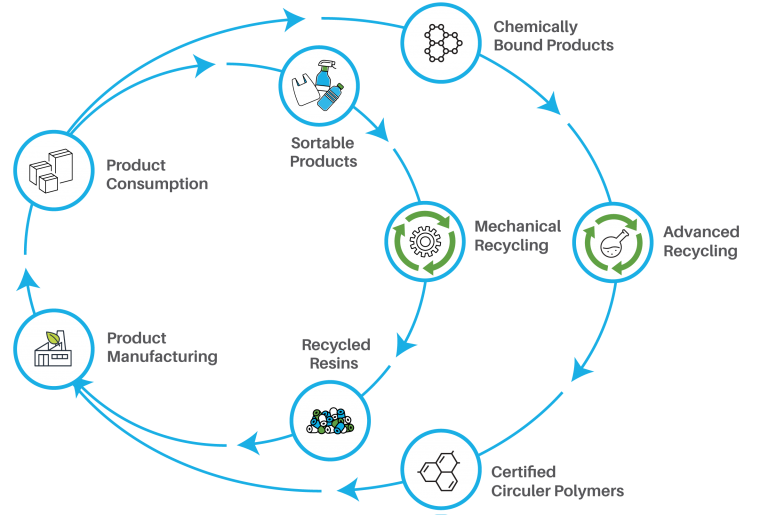News
How iSustain is Leading the Way in Advanced Recycling

As we grow increasingly aware of our impact on the environment, recycling has become an essential part of our daily routines. Our technology has grown over the years and is making recycling plastic easier. Advanced recycling, also known as chemical recycling, is one of these new technologies. It promises to revolutionize the recycling industry by increasing our ability to recycle plastics.
This new technology helps us avoid further climate impacts and reduces our demand for energy resources. Additionally, it offers tools for expanding the circular economy. In this post, we’ll explore what advanced recycling is, how it works, and its potential to transform the way we live, work, and consume.
What is Advanced Recycling?
To begin, we must understand what advanced recycling is and how it complements and expands current recycling solutions. There are two main recycling processes for plastic: mechanical and advanced. Advanced recycling is the process of using solvents, enzymes, heat, and/or sound altwaves to purify or break down plastic waste for recycling.
Advanced Recycling is an “umbrella” term for a range of technologies. These technologies repurpose complex recycled plastic waste streams into valuable materials that can be used in new products and packaging. These technologies include:
- Purification
- Decomposition
- Conversion
Advanced recycling technologies are a potential solution for difficult-to-recycle plastics that can’t be processed by mechanical recycling. Chemical pyrolysis, a prominent chemical recycling tech, alters the chemical structure of plastics, unlike mechanical recycling. It dissolves or heats plastics to break them down into their original components. Those components can then be used to make prime virgin resin.
You can use prime resin for any application. It unlocks the limitations in mechanical recycling where contamination limits its use. By creating virgin resin, we lessen our need to convert freshly “mined” petroleum and other virgin materials.
Advanced recycling offers a way to recycle materials that traditional methods struggle with. Mechanical recycling has limitations on types of contaminants that are allowable, limiting our ability to recycle certain plastics. For example, snack food and candy packaging films are difficult to recycle mechanically. Advanced recycling has the ability to overcome these challenges.
iSustain’s Role in Advanced Recycling
iSustain has dedicated its resources to advanced recycling and developing the supply chain necessary to supply this growing industry. Chemical recycling transforms plastics that were once headed for landfills. These plastics now become new prime resin, contributing to a circular economy.
iSustain’s mission is to create a circular economy where waste becomes a valuable resource rather than a burden. The concept of circular economy refers to an economic system that aims to reduce waste, increase resource efficiency and promote sustainability. The circular economy models are those that aim to keep resources flowing within a closed-loop system. This reduces the amount of built-up waste, and minimizes the adverse effects of pollution.

The Step-by-Step Process
Advanced Recycling technologies are leading the way in recycling plastic polymers back into virgin-like resins. iSustain’s advanced recycling process works as follows:
- A business incorporates hard-to-recycle materials into its production cycle.
- iSustain receives the chemically bound byproducts and ships them to one of their Advanced Recycling partners.
- Advanced recycling breaks down the waste at the molecular level.
- Chemical recycling creates certified circular polymers. The business can now use the virgin-like resin to recreate the materials needed for its production cycle.
Driving Advanced Recycling Education
iSustain collaborated with industry leaders at the Plastic Recycling Conference (PRC) in 2023 to promote advanced recycling technologies. This collaboration taught attendees how Advanced Recycling could improve their recycling program or reduce landfill waste. This offered attendees more choices for their flexible plastics and explained how advanced recycling can work well with traditional mechanical recycling.
With any new technology, education is needed to advance the industry. As the advanced recycling industry continues to grow and more investments are made, manufacturers, recyclers, and industry organizations should focus on the following to help make advanced recycling a more viable and widely available resource:
- Educate stakeholders on the different advanced recycling technologies.
- Establish and follow through with sustainability and post-consumer recycled content commitments/pledges.
- Educate legislative leaders on the benefits of advanced recycling.
- Support new recycling legislation that ensures responsible operations.
- Invest in transparent recycling companies engaged with stakeholders across the value chain.
Can Advanced Recycling Technologies Help You?
iSustain can help you determine if this new technology can be used in your recycling and waste management programs. Our cutting-edge technology and customized solutions allow us to provide effective waste management solutions that meet your unique needs.
We are dedicated to sustainability and compliance. By partnering with iSustain, your business can reduce its carbon footprint while staying compliant with the necessary regulations. Contact us today to learn more about our advanced recycling solutions.